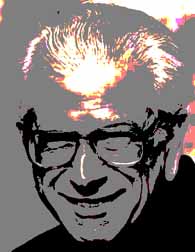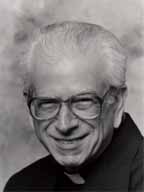




rnest Ferlita, SJ is an award-winning playwright, director, and teacher at
Loyola University New Orleans. Scene4’s Steve Esquerré spent some time chatting with him
SE: Let’s take a crack at your biography... I know it’s complex..
EF: No, it’s pretty straightforward. Born in Tampa, Florida, in 1927 and graduated from Jesuit High School in 1945. Went to Spring Hill College in Mobile that summer, and after my freshman year joined the Army for 18 months, most of it spent in occupation of Italy. And then, returning to Spring Hill, I graduated in 1950. That same year I entered the Society of Jesus (the Jesuits). That's when I really got interested in theatre, in both acting and writing. Three years after my ordination in 1962, I went to the Yale School of Drama for a BFA in playwriting and Dramatic Literature. After graduation in 1969 I began teaching at Loyola University New Orleans and have been here ever since, except for one year when I went on a Fulbright to teach drama at the Federal University in Curitiba, Brazil, and another year as Gasson Professor at Boston College.
SE: What was your road to becoming a playwright and director?)
EF: I started writing when I was in high school. I started a novel but never finished it. In college, where I performed in radio plays, I also wrote one; and later in the Society, when I was teaching for three years at Jesuit High School in New Orleans and directing plays there, I was asked to write a one-act play, and I did, and my playwriting took off from there.
SE: Tell us of your plays and what’s happened to them.
EF: My plays: several one-acts, including THE BELLS OF NAGASAKI and THE MASK OF HIROSHIMA, which were performed Off-Off-Broadway in 1996 under the title TWO
CITIES and published by Baker's Plays, and THE WITNESS, one of the winners of Love Creek Productions 1999/2000 Festival in New York and selected for the Samuel French Short
Play Festival. My first full-lenghth play was NEW FIRE, a play about St Ignatius, the founder of the Jesuits, written while I was doing my three years of philososphy, and it was performed in several high schools.  The next full-length play was THE BALLAD OF JOHN OGILVIE (a Jesuit martyr in Scotland) and it was performed Off-Braodway in
1968. Another play about a Jesuit, a Jesuit astronomer in China, was MA-FA. It was first performed at Loyola and later revised, and when I submitted it last year for the International Competition of Religious
Drama for the Jubilee Year, it won second prize. BLACK MEDEA was a play that received three Off-Off-Broadway productions, and with the last production won four Audelco Awards. BLACK MEDEA had been selected for the Spoleto Festival USA, brought
there by Loyola's cast and crew. Other plays of mine performed at Loyola: THE KREWE OF DIONYSUS, PURGATORIO, THE OBELISK, THE TWICE-BORN. I‘ve written the librettos for two
operas, DEAR IGNATIUS, DEAR ISABEL, performed at Loyola and two other universities, and EDITH STEIN. The music is by Kevin Waters, S.J.
The next full-length play was THE BALLAD OF JOHN OGILVIE (a Jesuit martyr in Scotland) and it was performed Off-Braodway in
1968. Another play about a Jesuit, a Jesuit astronomer in China, was MA-FA. It was first performed at Loyola and later revised, and when I submitted it last year for the International Competition of Religious
Drama for the Jubilee Year, it won second prize. BLACK MEDEA was a play that received three Off-Off-Broadway productions, and with the last production won four Audelco Awards. BLACK MEDEA had been selected for the Spoleto Festival USA, brought
there by Loyola's cast and crew. Other plays of mine performed at Loyola: THE KREWE OF DIONYSUS, PURGATORIO, THE OBELISK, THE TWICE-BORN. I‘ve written the librettos for two
operas, DEAR IGNATIUS, DEAR ISABEL, performed at Loyola and two other universities, and EDITH STEIN. The music is by Kevin Waters, S.J.
SE: What do you teach?
EF: I’ve taught playwriting at Loyola, and I direct plays. Other courses have to do with dramatic literature: American Drama and World Theatre, which starts with Greek drama and moves to the Restoration. Every age tells stories. That is a very human need and desire. And the story-telling of plays, because they are meant to be acted and not read, relates very closely to reality. We view them with "a willing suspension of disbelief." Sophocles' OEDIPUS REX is one of the first and greatest of tragedies, and Aristophanes' LYSISTRATA, one of the first and greatest of comedies. And then Shakespeare comes up with the best of both comedy and tragedy. Another course I teach is Vocal Theatre Workshop. The aim is to free the voice; to strengthen diaphramatic breathing and cultivate breath control; to secure optimum pitch and increase vocal range, resonance, and projection, to perfect pronunciation and articulation; and to make the voice, in sum, an instrument of dramatic expression.
SE: How do you determine who performs in the plays at Loyola? Are the upper-class students cast initially for specific roles?
EF: At Loyola we put on four plays a year, generally including a classic and a contemporary play and sometimes an original. We don’t have a graduate program in drama at Loyola, and so all the undergraduates, beginning in their freshman year, audition for the plays. The ones that seem best for a particular role, no matter what their year, are cast.
SE: What is the most important aspect you convey to your students regarding acting?
EF: Enter the character, express in both voice and body what he or she discovers.
SE: What are Loyola’s theatres like?
EF: Loyola has two theatres, Marquette theatre, a proscenium theatre (seats about 150), and The Lower Depths, a black-box theatre (seats about 70). There will be a change for the better soon. The library moved into a new building last year, and the old building will be renovated for the Visual Arts department and the Drama Department. All of Visual Arts will move into the building; the Drama Department will build a bigger black-box theatre there and a scene shop
SE: How do you view Catholic theatre? :
EF: I must say I have never used the term "Catholic theatre." I remember Graham Greene didn't want to be called a Catholic novelist. Even though his characters and their situations were often Catholic, he wasn't trying to promote Catholicism; he was just trying to tell a good story. So it is with playwrights. Even Shakespeare's HAMLET is Catholic in this sense. Of course, there are plays with religious themes. Like that play of mine about the Jesuit martyr in Scotland. And it was done Off-Broadway at the Blackfriars Theatre, which could indeed be called a Catholic theattre, the only one as far as I know in New York City. In 1960 it began advertising itself as the "oldest continuous Off-Broadway theatre," but in 1972 it had to close down, partly because the building on 57th Street that it occupied was to be torn down to make room for a new high-rise office building.
SE: How do you view today’s theatre?
EF: There's no doubt that film and television draw actors away from the stage and greatly reduce the number of audiences. But theatre will never be outdated. The experience of seeing characters come alive in a human situation onstage cannot be replaced. And good plays continue to surface. What makes a play good is a good plot. As Aristotle says, the plot "is the first principle and as it were the soul" of a play; it is "the imitation of the action" of a play. The action of a play is the working out of a character's motive to its end. I think most playwrights would agree. I think that's what playwriting is all about
-- Steve Esquerré
ernest ferlita
steve esquerre
© 2000-2001 Aviar-DKA Ltd. All rights reserved (including authors’ and individual copyrights are indicated). No part of this material may be reproduced, translated, transmitted, framed or stored in a retrieval system for public or private use without the written permission of the publisher and the individual copyright holder. For permissions, contact publishers@scene4.com.
